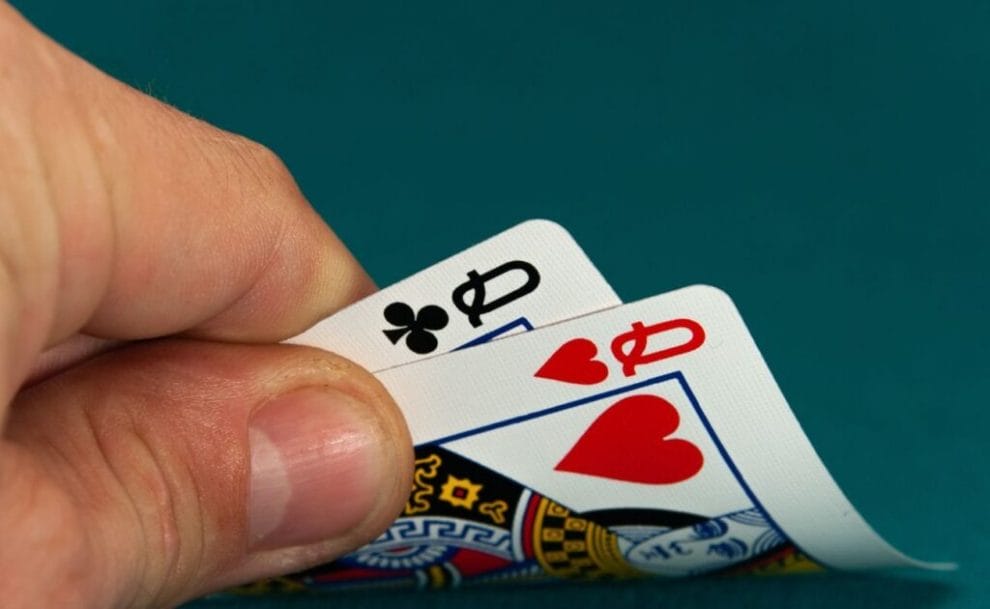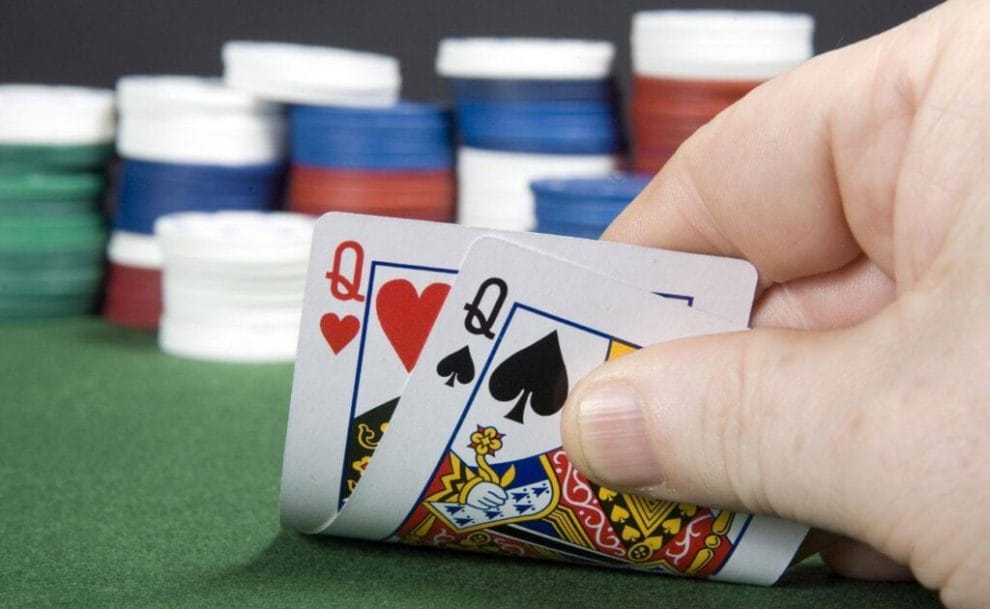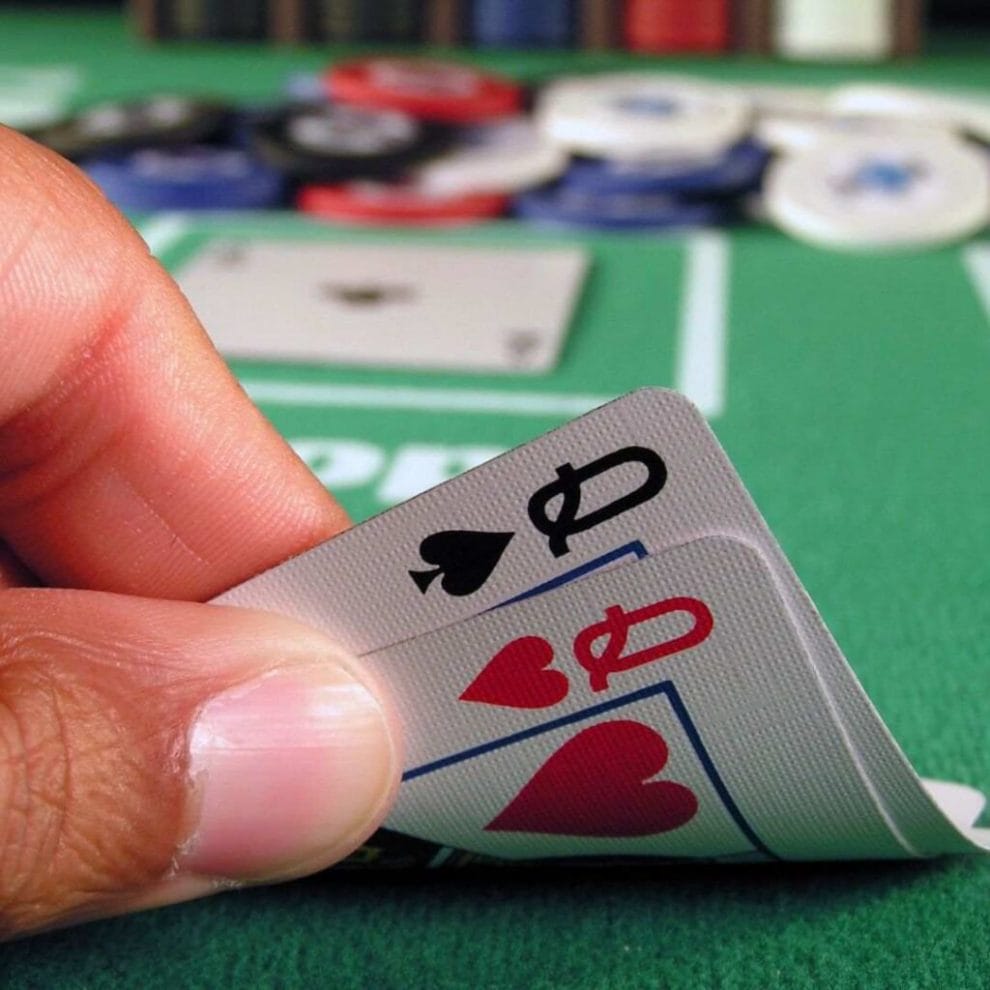
Whether you’re in an online poker tournament or a live cash game, looking down at two queens is always a good thing. Although this premium hand is ranked as the third-strongest hand in poker, some tricky situations may still arise — most notably if an ace or king appears on the flop.
The win rate with queens may already be high, but that doesn’t mean you can’t learn a thing or two to improve your strategy and play this hand optimally. In this guide, you’ll learn how to improve your chances of winning in various situations.
Preflop Strategy

As with any poker strategy, you first need to think about how to play preflop. This is where your pair of queens is the strongest, so it’s important to make the most of it.
Here are some general tips you should follow whenever you have two queens. These will help you to maximize both your land-based and online poker win rates.
Almost Always Raise or Re-Raise
As the third-strongest pocket pair, it makes sense to build the pot as early as possible. As a result, you should almost always raise or re-raise when the action folds to you.
For unopened pots, you’ll definitely want to enter with a raise. Typically, your sizing should be around three times the value of the big blind. What’s more, you should also 3-bet when faced with a raise from an opponent. When you elect to 3-bet, the size you use will depend upon your position at the table.
If you have position over the original preflop raiser, your 3-bet should be roughly three times the size of their raise. However, if you’re out of position, increase this to around four times the size of their wager.
Times When You Shouldn’t Raise or Re-Raise
There are some cases where you might be better served calling rather than raising. However, these are pretty rare.
For example, if an opponent who typically plays very tight suddenly opens preflop from under the gun. There’s a good chance that this opponent has a stronger hand, such as pocket aces. It can make sense to call if you’re in late position and see what the flop brings.
If you’re facing a 3-bet from one of the blinds after opening from early or middle position, 4-betting is less advisable, as your opponent’s range is strong. Having two queens doesn’t provide enough value to 4-bet here. Instead, it’s best to call.
How To Play Postflop

Whenever you have a pair of queens, there’s a great chance you’ll be seeing the flop. So, you need to know how to proceed postflop in order to make the most of these premium poker hands.
Your strategy, as is often the case, will depend greatly on the situation you find yourself in. The next section contains cash game strategy advice to help you play Q-Q postflop.
Never Slowplay on a Low Flop
If you have an overpair on the flop, you should resist the urge to slowplay. In this situation, you’re in a very strong position and should look to extract as much value as possible.
For example, flops like the following are ideal:
2♦ 8♣ T♥
J♥ 5♠ J♣
In both of these situations, you have an overpair, meaning your pocket pair is higher than any card on the board. In the second example, you may occasionally encounter an opponent with three of a kind. However, you should still play aggressively in most cases, as it’s usually a bad idea to be scared of rare and unlikely hands.
This is especially true if you’re in a heads-up pot. Whenever there are fewer opponents to worry about, there’s a much greater chance of success.
You might want to slow down your aggression if you face a raise from an opponent who normally plays tight. This is particularly pertinent if you’re in a multiway pot, where bluffing is much less likely to occur.
Facing an Ace or King on the Flop
While Q-Q is a strong starting hand preflop, it loses value if an ace or king hits the flop. Here are some examples of tricky situations for queens:
A♣ 5♦ 3♣
K♥ T♠ 7♥
In either spot, an opponent could easily have a card that would give them a stronger pair. This doesn’t necessarily mean you should fold or expect to lose in such situations. It just means you need to change your approach somewhat.
Your opponent could easily still have an unpaired hand or a lower pair that you can beat. If this is paired with a flush or straight draw, your opponent can easily become more aggressive and turn smaller pocket pairs into bluffs.
Instead of going all out, showing restraint and exercising pot control is important. For example, instead of firing on all three streets, you could just bet the flop, check the turn, and bet the river. Alternatively, slow down on the flop, before betting on the turn and the river.
This will ensure you still extract plenty of value out of your queens without the pot growing out of control. If your opponent does have a hand that beats you, you’ll generally know by the river, as they’ll be showing more aggression.
Taking Care in Multiway Pots
As mentioned, you should exercise more caution if you’re in a multiway pot. On low-card boards, it’s best to continue playing aggressively. However, you must watch out for big raises, especially on the turn or river.
Typically, players won’t raise on the turn or river unless they have the best possible hand. While some opponents may still bluff, it tends to be less common in multiway pots. Having a good read on the players at your table will help you understand their possible ranges better.
Poker Games Fit for Queens
Possessing a pocket queen hand won’t necessarily guarantee a win. However, it definitely puts you in a strong position, especially if you follow the above advice. Whether you’re playing online or at a live table, these strategies will help you maximize your hand’s value. If you’d like to play poker online and put this knowledge to the test, register with Borgata Online today. There are hundreds of Hold’em tables to join at a wide range of stakes, not to mention regular daily and weekly tournaments.
